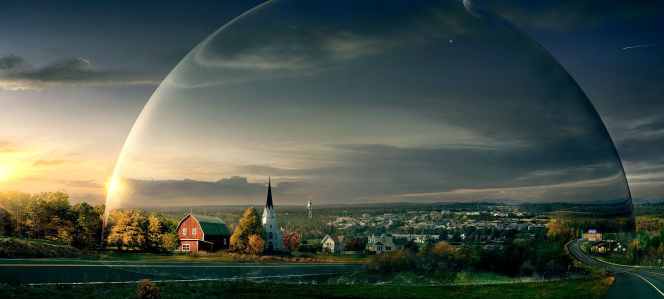I recently caught myself up on the latest episode of the saga “Under the Dome” in which a town named Chester’s Mill is caught inside a mysterious, indestructible, invisible dome. No one knows the dome’s origin and through the course of the show the viewer slowly begins to unravel the deep roots of this odd happening.
However, the most intriguing aspect of the show is the reactions of those who live inside. One common mantra among the people is “within this small dome, none of our secrets are safe.” There’s a real lesson to be learned here, one that seems increasingly common in movies and shows today, which is that utopianism, whether forced or voluntary, is an ideal that simply cannot work in a society where concupiscence is still within man. This is the case both within politics and the Church. While the show isn’t necessarily intended to be an exhortation on the virtues and vices of the utopian society, we see the questionable nature of man’s vehemence toward his own will pitted against the good of the society around him.
We might think the people of Chester’s Mill would naturally pull together and begin living for one another. And indeed this principle is initially evident. However, we find that even though the end goal is survival and perhaps even flourishing, our own failings, our own desire to master our situations claim power lead to a much bleaker reality. While shows like this might seem to be little more than an exposition of fallen man, I find there is also an incredible amount of hope. Even in this superficially dark and frightening moment of forced utopianism, we find the desire for justice and the acts of self-sacrifice among the near barbarism of neighbor-against-neighbor. And I think that that is where the brilliance of the Christian message shines brighter than any other notion of life with one another.
It can be very tempting for us as created beings who suffer on a regular basis to determine how to sample heaven in the here and now. However, this simply isn’t feasible. This is why in many of the dystopian movies, such as “The Giver”, the emotions and desires of the people must be removed before the society can truly become what one might call balanced. The problem is that the human heart desires more for itself. The soul screams from deep within that it prefers the danger of choice than the colorless reality that often occurs following some form of a utopia.
Christianity offers such a choice. Will you be a man of sacrifice or one of brutality? Will you hold others above yourself or will you join the ranks of selfishness and despair?
Instead of histrionics and polemics, the Christian message offers hope among the incredible divisiveness of the world. Does this mean that the Church is distilled from such criticism? Of course not. One look at the Church’s history and present reveals many disagreements and violent conflicts. However, holding fast to the principles of truth and the cross of Christ offers not only hope in dark and confusing times, but a guide towards the ultimate good that we all desire: love.
The test of the Christian message comes for us through the difficult times and presents its choice, “Do you also want to leave?” (John 6:67). In a time such as ours which appears to be nothing but polemics and disagreement, the ultimate question for all of us lies on our answer to Christ’s admonition to His apostles. When times are hard, will we hold fast to the foot of the cross of will we let go and allow our own wills to power us forward?
Man is indeed a fallen creature. We wouldn’t question our own goodness among such suffering if this wasn’t a certainty. In trying to build a better society, rather than modeling our earthly life after the failed experiments of Marx, Rousseau, Comte, Schopenhauer and the like, the world would be much better off by building society upon small acts of kindness and love to one another and self-sacrifice as the core of marriage, family and society. Not a love of humanity as the great end of progress but rather a love of one another to progress towards the great end of heavenly bliss together.
As G.K. Chesterton stated, “To love means loving the unlovable. To forgive means pardoning the unpardonable. Faith means believing the unbelievable. Hope means hoping when everything seems hopeless.” The true utopianism we all desire and the place of peace in which these outwardly sinister acts have no place is in the beating, life-changing heart of Christ. So, while “Under the Dome” might indeed be a scary prospect if it were to happen in our own lives, we must take courage that whatever choices we make, either to embrace the call of sacrifice or to abandon the virtues we profess, we find true freedom and hope only in the recognition of St. Peter, who asked Jesus, “To whom else shall we go?”
